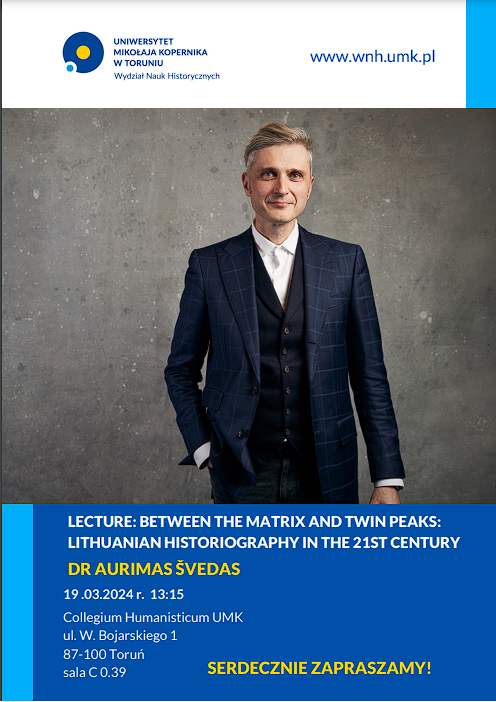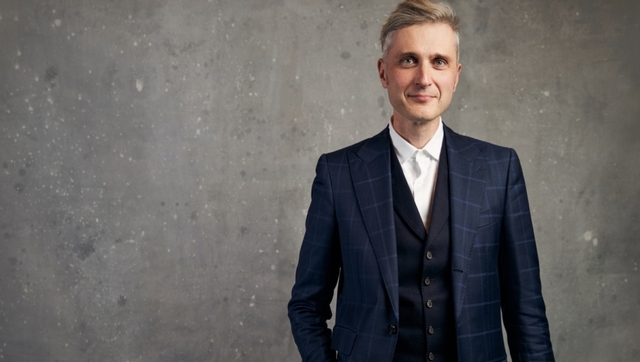Dr. Aurimas Švedas from Lithuanian Institute of History and an associate professor at Vilnius University visited NCU and gave a lecture titled Between the Matrix and Twin Peaks: Lithuanian historiography in the 21st century. The lecture discussed such topics as the crisis of time in history, the role of a historian in modern society, and historical empathy.
About Dr. Aurimas Švedas
Dr. Švedas is an associate professor at Vilnius University. He is mainly interested in Lithuanian historiography and history. He is also interested in theory of history and has published several works on the subjects of history and Lithuanian history (like In the Captivity of the Matrix: Soviet Lithuanian Historiography, 1944–1985 and Hard to Be a God: Historians in the Face of Evil). In his work, Dr. Švedas aims to present a new view on the role of a historian in the 21st century and reflects on the various aspects of Lithuanian historiography, both positive and negative.
Dr. Aurimas Švedas on the crisis of time and the role of a historian in modern society:

The Crisis of Time or The Temporal Chaos of history
History has become a complicated topic nowadays. According to Dr. Švedas, this is due to a phenomenon called the crisis of time. Historians have noticed that in the modern era, the lines between the past, the present, and the future are blurred. The Lithuanian scholar explained that as time progresses, the perception of history changes. Because of that, the past constantly influences the present, and the present is constantly afraid of the future.
The main problem with the past is traumatic memory society has of it. This is mainly caused by the tragedies of the 20th century. The fact that engaging with this period is considered difficult does not help. Moreover, since the year 2022 and the start of war in Ukraine, societies of Eastern European countries question whether the history of the 20th century has truly been dealt with.
To further illustrate the idea of the crisis of time in history, Dr. Švedas used examples from the most recent history of Lithuania. The first example was a book by Marius Ivaškevičius called Žali (Eng. Green). It created many controversies due to its portrayal of Lithuanian partisans. The Lithuanian society did not agree with the perspective presented in the book.
Another example presented by the Lithuanian scholar was the creation of a beach in front of a former KGB building in the centre of Vilnius. While the intent was to move on and create something new in place of something old and painful, the public did not approve of that change. Ultimately, in this case, the law was introduced in order to safeguard the historical integrity of this part of the city.
The role of a historian in the modern age according to Dr. Aurimas Švedas
Another important problem discussed by Dr. Švedas was the role of a historian in the 21st century. Firstly, he established that scholars working on difficult topics have to constantly self-reflect. This self-reflection has to be encouraged, and the ability to criticize history and the work of previous historians has to be developed as a result.
Secondly, a modern historian has to feel responsible for the history he or she is trying to reconstruct. This means that a historian has to fairly present the fate of historical figures while also providing society with a modern outlook on the past.
Finally, the modern-day historian has to be empathic. He has to understand the motifs behind the actions of historical figures while also being critical. This empathy gives us a chance to build bridges between nations that were antagonistic in the past. Dr. Švedas brought up the case of the Polish-Lithuanian Union as an example of an empathic view on history. He claimed that nowadays, Lithuanian historians see this historical event as a costly opportunity to join the broader European community that was given to Lithuanians by history.
Conclusion
In his closing thoughts, Dr. Švedas concluded that historians, not only Lithuanian but world-wide, have to create connections between the narrow historiography of their nations and the history of the world. He also stated that, unfortunately, there is not enough interest currently, at least in Lithuania, in leaving those boundaries.
For interviews with other scholars see also World Copernican Congress – Internationals.
[Fot.: Collegium Humanisticum UMK]

